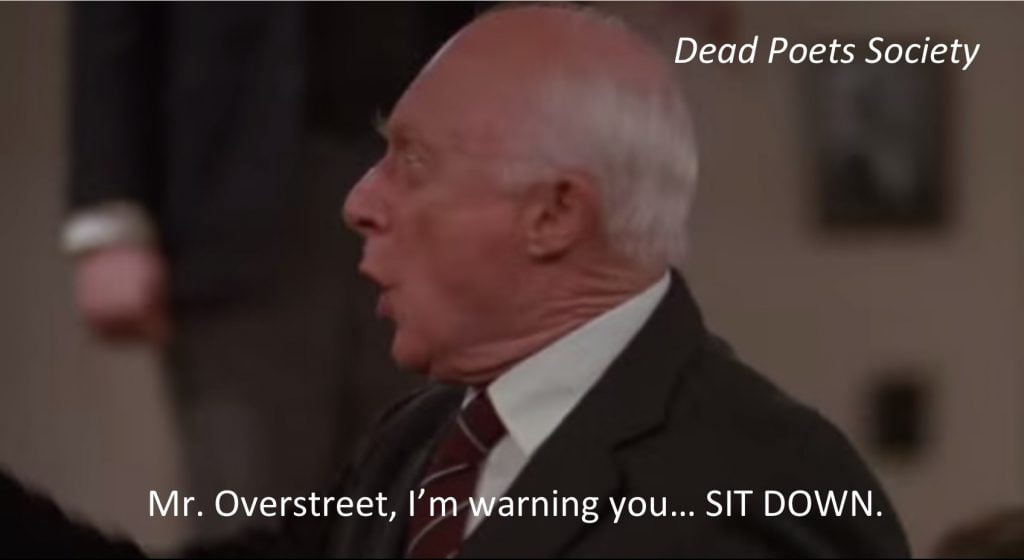Today, I walked down the English Department corridor at Seattle Pacific University and saw something that stunned me.
I saw a friend of mine, a recent graduate of SPU’s MFA in Creative Writing program, settling into his new office. For most people, this would have been an unremarkable sight: a professor at work. But it startled me, and not for the first time. I was expecting — and will, for a long time to come, go on expecting — to see someone else beyond that door. I thought I’d see Dr. Luke Reinsma, a legend of SPU’s English program, surrounded by his books, his feet up on his desktop, the Oxford English Dictionary open in his lap. It’s a sight I’ve seen frequently over almost 30 years of experience at this university. It means a lot to me, as Reinsma is one of the most influential figures in my history.
Here’s the thing: I’ve had time to get over this. Reinsma announced his retirement a few years ago. And I wrote an essay celebrating his legacy back then, before he found ways to keep one foot in the work of teaching by covering some adjunct courses here and there.
But now that his bookshelves are gone and someone else is setting up shop, I feel it’s time to re-post this: an article I wrote for Christianity Today. At the time, CT’s entertainment editor Alissa Wilkinson had asked me to write about a movie that I’d changed my mind about. I thought of Dead Poets Society. And then I realized it was a chance to write about my favorite professor.
Here’s what I wrote, what Christianity Today published, four years ago this week.
He’s leaving. I can hardly believe it. Dr. Luke Reinsma, professor of English at Seattle Pacific University, is retiring.
Two weeks ago I revisited Peter Weir’s Dead Poets Society for the first time in twenty years. Watching Robin Williams play that charismatic English teacher who transforms the lives of repressed prep-school boys, I had flashbacks to my undergraduate years when Reinsma was my academic advisor.
As a freshman at SPU in 1989, I found that this idiosyncratic professor lived up to the reputation I’d heard from former students. I learned to love how, when he handed back my essays, he had written almost as much on them as I had written in them. An exploration of The Canterbury Tales, a coffee conversation about the origins of the Arthur legends, an independent study of Old English, a post-movie talk about Quentin Tarantino—every time we met, we dug deep into the substance of our subject.
Now, he’s boxing the books that blessed his office with an aroma of scholarship and mystery. I’ll miss his Richard Farnsworth mustache. His quick and mischievous eyes. The perpetually windblown hair that he sculpts wildly with both hands as if trying to wring out the words he needs to express his big ideas.
He changed my mind about so many things. I realize now that, due to his influence, even my perspective on Dead Poets Society has changed — dare I say matured?
The Space Between Chaos and Control
Still shaken by news of Robin Williams’ death, I knew that even his mediocre movies might now become emotional experiences. Williams was such a commanding big-screen presence that some filmmakers seemed to think that they needed nothing more than his improvisational genius to make a good movie. But his did his best work—The Fisher King, Good Will Hunting, Insomnia, Awakenings—with directors who knew when to restrain him and when to unleash his Tasmanian Devil personality.
That tension between chaos and control made him perfect for the Dead Poets role of Mr. Keating.
Set in 1959, the film focuses on the strict routines, rituals, and rigor of Welton Academy, a conservative preparatory school where young men are pressured to score highly on tests not only by headmasters and instructors but also by demanding parents. In their classrooms, in their rows, at their desks, on the clock—everything happens by the book.
Mr. Keating takes a sledgehammer to their comfort zones. The first thing he does? He gets them moving—bodily—as if education might involve more than the head. He leads them out of the classroom and coaxes them to engage mysteries.
Similarly, Dr. Reinsma led his undergraduates out from under the merciless buzz of fluorescent classroom lights into the cool of Pacific Northwest mists, up challenging trails in the Cascades, until we emerged above the clouds to study our texts on sunny mountaintops.
Keating climbs too—right up onto his desktop. And then he invites his students to follow. “Why do I stand on my desk? . . . To remind myself that we must constantly see things in a different way.”

So Reinsma had us discuss how texts challenged, unsettled, and even offended us. We learned that “love thy neighbor” means listening to experiences altogether different from our own. And he coached us to voice personal reactions, craft personal opinions, and back up personal interpretations with textual support. We were not there to receive his perspectives, but to discover our own.
Keating seeks to save spoiled, obedient boys from society’s narrow definitions of success. “Medicine, law, business, engineering—these are noble pursuits, necessary to sustain life,” he says. “But poetry, beauty, romance, love—these are what we stay alive for.” The arts, he knows, can equip young hearts with compasses of conscience and passion.
Similarly, Reinsma was (and still is) allergic to the idea that arts and literature are a garnish on the plate of academia. It pained him to see so many schools prioritizing business, science, and mathematics, as if doctors were telling him that the health of the hands and the head mattered more than the health of the blood and the heart.
You’d guess that I embraced Dead Poets Society as a personal favorite.
You’d be wrong.
Threatened by Freedom
I first saw Dead Poets Society a few weeks before I moved from Portland, Oregon, to “the Emerald City” for college. In some ways, the movie impressed me. I already dreamed of a career that allowed me to write and teach, so I applauded Mr. Keating’s passion for literature. On that, we agreed.
Moreover, the film’s young cast—Robert Sean Leonard (who would later play Watson to Hugh Laurie’s Holmes on TV’s House), Josh Charles (whose role on TV’s The Good Wife would win him a host of female fans), and Ethan Hawke (who . . . well, you know Ethan Hawke)—powerfully impressed me.
Nevertheless, I came out of Dead Poets Society grumbling. And I furrowed the brows of my fellow English majors by holding a grudge against it all through college.

At the conservative evangelical institution I attended kindergarten through high school, I had always sought to fulfill and exceed the hopes and expectations of not only my teachers but also the God in whom they had taught me to believe. That meant achieving “straight A” report cards in academics and in morality. No misbehavior, no drugs, no sex, no profanity—you know the drill. Their guidance seemed to work: In my senior year, I lived up to their hopes and graduated with honors and scholarships. Might as well have draped a “Mission Accomplished” banner in my bedroom. I was ready for the rest of my life.
Not really.
Outside of the school’s controlled environment, I was deeply insecure. I knew how to impress adults, but not my peers. Fearing the peer pressure that Friday chapel assemblies had warned me about, I was utterly terrified of unsupervised parties. I became judgmental toward (and, frankly, jealous of) classmates who enjoyed greater freedoms than I did. My imagination animated scenes of extracurricular debauchery. To escape, I lived in a self-inflicted quarantine, troubled by dark speculation about those who might be drinking, smoking, or going out on unchaperoned dates.
As I watched Dead Poets Society, Welton’s oppressive administration seemed like the Evil Empire—but Mr. Keating seemed like an equal and opposite threat. With his “Seize the day!” mantra, he seemed to shout “All things are permissible!” without the necessary caution of “But not all things are profitable!” He seemed a false Christ, granting his students a license to lust, sending them off into lives of unhinged sensualism.
It didn’t make me any more comfortable to see a character who looked like me—tall, awkward, and big-nosed—getting drunk at a party, then trying to kiss another young man’s girlfriend while she slept. (You know what really stung? His name is Overstreet.)
Watching Neil Perry—the student whose burgeoning love of the arts is crushed by his father’s condemnation of “nonsense”—become a tragic figure, I blamed Mr. Keating’s apparent disdain for parental authority. I felt he had goaded Neil to embrace drama and disrespect over discernment, and thus the boy had lost all control. Nothing short of a conversion to Christianity—I believed—could have straightened Neil out. Keating had failed to show Neil what really mattered.
And that’s where I misjudged the film so badly.
I was so preoccupied with the boys’ reckless rebellion that I missed the contrast between their sophomoric declarations of independence and their compassionate teacher’s counsel. “Sucking all the marrow out of life,” says Keating with quiet authority, “doesn’t mean choking on the bone. Sure, there’s a time for daring . . . and a time for caution. And a wise man understands which is called for.”
In sharp contrast to the boy’s controllers, Mr. Keating models a healthy balance of freedom and responsibility. He descends into that world of order, accepting the form of a servant, and makes all things new. He shows them what the imagination, taking the shape of love, makes possible.
He may not speak of Jesus. But he’s an imitation of Christ.
A Delicate Balance
Looking back at authority figures who have inspired my respect, and at those who have been driven by ego and a desire to control, I’ve come to suspect that anyone who seeks to instill character in another person by force will produce an equal and opposite reaction. Those Dead Poets boys aren’t anarchists or hedonists. They’re human beings pushing back against forces that would press them into dehumanizing molds.
Are they extreme? Immature? Petty? Sometimes. But who can blame them? Who, besides Keating, has shown them an example of wisdom and integrity?
The film’s tragic turn comes when those given authority over Neil show no respect for his imagination or sense of calling. They serve their own ends. I’d even say that Neil’s father is threatened by the possibility that his son might find more fulfillment than he, in his fearfully insulated world, will ever permit himself to know.
It’s a dangerous business—freedom. I’ve known those who, given their first glimpse of it, plunged without discernment into rash decisions, costly consequences, and never recovered. My younger self would have said, “I told you so.” Now I wonder: What (or who) inclined them to throw themselves overboard? Moreover, I’ve seen others who live in fortresses of caution and self-righteousness, showing no grace to those who live more freely. In either case—there, but for the grace of God, go you and I.
God forbid that I punish my younger self for holding respectable principles. No—I’m just saying that I held them too tightly. What began as desire to avoid sin darkened into judgment of (I called it “praying for”) anybody who appeared to enjoy what seemed dangerous, no matter how responsibly they enjoyed it. So long as “the laws” of my moral universe served as guardrails to keep me from crashing out of bounds, they were meaningful. But when I began looking down on others from a place of prideful “righteousness,” my precious morality stopped supporting life and stifled it.
With the guidance of teachers like Reinsma, I’m coming to see how my fears of injury have kept me from climbing mountains. I explore a larger world now, and I’m grateful. As we learn to exist in that tenuous balance between courage and caution, we will all stumble. But that’s how we learn to mature from the basic exercises of “righteousness” into the exhilarating dance of grace.
A Grand Conclusion, A New Beginning
At the conclusion of Dead Poets Society, Mr. Keating is betrayed by a student and dismissed by the school. But as he departs from a faculty of smugly authoritative traditionalists, he clearly remains the boys’ one true mentor, teacher, and inspiration.
For Dr. Reinsma at Seattle Pacific, the story has a happier ending. His “Last Lecture” was met with uproarious applause from a teary-eyed audience of grateful students, alumni, and admiring faculty. I cried too. But I realize now, thanks to the final moments of Dead Poets Society, that Dr. Reinsma cannot retire from teaching. A title, an office, a classroom—those are not the source of his influence. It’s who he is. It’s how he lives. Those around him will go on learning from his example.
The Dead Poets Society honors Keating by standing on their desks. It’s a beautiful tribute. It works. But I don’t want to stand on a desk for Reinsma. Someday, I’d like to stand behind one. Or, wait . . . no! Better yet—I want to push desks aside entirely, draw students out of gridlike rows, and go with them into larger worlds that my greatest teachers opened for me.
It would be a daunting responsibility. And an extravagant privilege. I would need a healthy sense of caution, yes. But also—a courage better known as “faith.”


